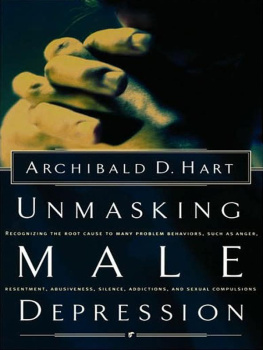
NOTICE
This book is intended as a reference volume only, not as a medical manual. The information given here is designed to help you make informed decisions about your health. It is not intended as a substitute for any treatment that may have been prescribed by your doctor. If you suspect that you have a medical problem, we urge you to seek competent medical help.
Mention of specific companies, organizations, or authorities in this book does not imply endorsement by the author or publisher, nor does mention of specific companies, organizations, or authorities imply that they endorse this book, its author, or the publisher. Internet addresses and telephone numbers given in this book were accurate at the time it went to press.
2004 by Jed Diamond
All rights reserved. No part of this publication may be reproduced or transmitted in any form or by any means, electronic or mechanical, including photocopying, recording, or any other information storage and retrieval system, without the written permission of the publisher.
Book design by Joanna Williams
Library of Congress Cataloging-in-Publication Data
Diamond, Jed, date.
The irritable male syndrome : managing the 4 key causes of depression and aggression / Jed Diamond.
p. cm.
Includes bibliographical references and index.
ISBN 1579547982 hardcover
eISBN 9781623361501 ebook
1. Depression in men. 2. Anger. 3. HormonesPsychological aspects.
4. MenMental health. 5. MenSocial conditions. I. Title.
RC537.D478 2004
616.85'27'0081dc22
2004014395

C ONTENTS
A CKNOWLEDGMENTS
F or my children, Dane, Evan, Jemal, Angela, and Aaron, and my grandchildren, Shelby, Jacob, Cody, Teanna, Sierra, Deon, Derrick, Hailey, Drayke, and Christian. You are the hope of the future.
My wife, Carlin, is really the coauthor of this book. A great deal of what I know about the Irritable Male Syndrome I learned from the person who was living with someone who was suffering from it.
The guys in my mens groups have helped heal my wounds and have put up with my continuing requests of Tell me what its been like for you.
Nancy Ellis-Bell is the agent every writer longs to have. She is passionate about books, truly cares about her authors, knows the publishing business from top to bottom, and is a master of her craft.
The people at Rodale Inc. have helped bring an idea to reality. I want to particularly thank executive editor Jeremy Katz; Kathryn C. LeSage, whose creative editing has made this book much more complete and readable than it would have been otherwise; Cathy Gruhn, whose publicity and promotion team have helped get the word out about the book; and many others who have worked behind the scenes to put this book in your hands.
My many colleagues have been wonderfully supportive over the years. There are way too many to mention, but you know who you are. Some of you have been particularly supportive of this book, including Reid Baer, Dan Bollinger, Jean Bonhomme, Jimmy Boyd, Jim Bracewell, Malcolm Carruthers, Jane Chin, Gordon Clay, Sam V. Cochran, Will Courtenay, Mitch DeArmon, Vickie DeArmon, Warren Farrell, Mary Furlong, Larrian Gillespie, Tom Golden, Frank Gomez, Michael Gurian, Ron Henry, Bert Hoff, Steve Imparl, Courtney Johnson, Stephen Johnson, Siegfried Kasper, Bill Kauth, Joe Kort, Sid Kramer, Howard LaGarde, John Lee, Pat Love, John McManamy, the Mens Health Network, Siegfried Meryn, Hari Meyers, Fredric E. Rabinowitz, Damian Sebouhian, Rich Tosi, and Clement Williams.
Finally, I want to thank the thousands of men and women who have opened their lives to me. May their courage inspire others as it has inspired me.
WH AT WERE LEARNING FROM THE FEEDBACK OF 10,000 MEN
W hen I began the research for this book, I had some ideas about the Irritable Male Syndrome (IMS) based on my experiences working with male clients and their partners, and on the thousands of e-mails I had received from people who had read my previous books. I knew that there was a relationship between IMS and the hormonal changes that males experience while going through puberty and at midlife, when going through andropause (male menopause). I also believed that there was a relationship between irritability, aggression, and depression in men.
What I didnt have was data from a large number of men. When I finalized my agreement with Rodale to publish The Irritable Male Syndrome, my editor allowed me to put the two questionnaires I had developed for the book on the Mens Health magazine Web site. The response was overwhelming. Nearly 6,000 men filled out the Irritable Male Syndrome Questionnaire, and nearly 3,500 filled out the Male Depression Questionnaire. The men ranged in age from 10 to 75.
In order to analyze the voluminous data pool, I hired Courtney Johnson, who is an expert in psychological testing with Ph.D.s in statistics and psychology from Duke University. The information was quite interesting and gives us the first look into the world of men experiencing the Irritable Male Syndrome. The men were asked a series of questions and had four options for answers: almost never, once in a while, often, or almost always. The following highlights stood out:
Stress is a significant issue for men.
Only 8 percent said they are almost never stressed.
Forty-six percent said they are often or almost always stressed.
Sex is a major concern.
Forty percent of the men said they are almost never sexually satisfied.
Depression and irritability are related.
Twenty-one percent of the men said they are depressed often or almost always.
Only 9 percent said they are almost never irritable; 40 percent are irritable often or almost always.
Emotions related to anger are significant.
Only 7 percent of the men said they are almost never annoyed; 50 percent are annoyed often or almost always.
Eight percent of the men said they are almost never impatient, while 57 percent said they are impatient often or almost always.
Nine percent said they are almost never tired, while 54 percent said they are tired often or almost always.
Ten percent said they are almost never frustrated, while 45 percent are frustrated often or almost always.
Eleven percent said they are almost never dissatisfied, while 45 percent said they are dissatisfied often or almost always.
Twelve percent said they are almost never sarcastic, while 54 percent said they are sarcastic often or almost always.
Seventeen percent said they are almost never exhausted, while 43 percent said they are exhausted often or almost always.
Forty-six percent said they are bored often or almost always.
Emotions related to depression are significant.
Only 7 percent said they almost never have a desire to get away from it all, but 62 percent said they often or almost always desire to get away.
Only 11 percent said they almost never have a strong fear of failure. More than half55 percentsaid they often or almost always have a strong fear of failure.
Twelve percent said they almost never feel burned out, compared with 44 percent who said they feel burned out often or almost always.










